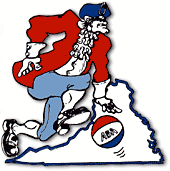
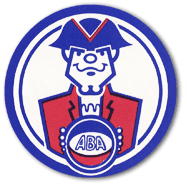

   |
Virginia SquiresYears of existence: 1970-71 through 1975-76
|
Back to "Remember the ABA" Main Page
Did you see an Virginia Squires game? Or, did you have a favorite Squires player? Contribute to this web page by
The Squires were a legendary ABA team, but not necessarily because of their success on the court. Instead, the Squires will always be remembered for unearthing (but not keeping!) future Hall of Fame players Julius Erving and George Gervin.
The Squires moved to Virginia in 1970 after spending one year in Washington, D.C. as the Washington Capitals (1969-70), and two years in Oakland as the Oakland Oaks (1967-69). Like The Floridians and the Carolina Cougars, the Squires were a regional franchise and played their games in several Virginia cities: Norfolk, Hampton, Richmond, and Roanoke. After the 1971-72 season, the Squires abandoned Roanoke, mainly because their attendance was much higher in the other three locations.
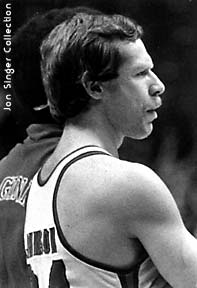 |
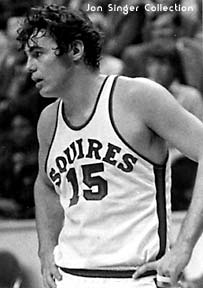 |
Doug Moe (above right, #15) had played with the franchise during its second year in Oakland (the 1968-69 championship year). After one season with the Carolina Cougars, Moe was reunited with longtime friend and teammate Larry Brown. While Moe's knees were beginning to give out, he still averaged 13.0 points. The Squires' "super-rookies" included Charlie Scott (above middle, #33) and George Irvine (right, # 30). Scott certainly didn't look like a rookie in 1970-71. He tore through ABA defenses, averaging 27.1 points (5th in the ABA) and 5.6 assists (4th in the ABA). Scott shared the 70-71 ABA Rookie of the Year award with Dan Issel of the Kentucky. Irvine didn't play much that year, but he demonstrated a fine shooting touch, hitting an impressive 56% from the floor. Virginia also added Neil Johnson (above left). Johnson came to the Squires from the NBA Phoenix Suns. Johnson's rugged style was a good fit in the ABA. Johnson quickly took on the role of the team's "enforcer," and became a fan favorite. |
In each of their first two seasons in Virginia, the Squires almost made it to the ABA Finals. In the first round of the 1971 ABA Playoffs, Virginia beat Rick Barry and the New York Nets in a tough six game series. In the second round, the Squires held the home court advantage against the Kentucky Colonels and Dan Issel, but lost the series 4 games to 2.
After the addition of rookie Julius Erving the next season, Squires fans were optimistic that the team could win the ABA Championship. Their hopes seemed to suffer a severe blow, however, when team scoring leader Charlie Scott abruptly left the team a few weeks before the end of the regular season. At first, the absence of Scott didn't seem to matter as Erving and the Squires easily swept the Floridians in the first round of the 1972 ABA Playoffs . The Squires had to go overtime at home in Game 1 for a 114-107 victory. Game 2 was on national television (CBS), and the Squires ran away with a 125-100 victory. The series then shifted to Miami. In Game 3, Erving scored an incredible 53 points as Virginia barely won 118-113. Game 4 was not close (despite the fact that Erving scored "only" 39 points) and the Squires closed out the series 115-106. In this series, Erving was simply dominant. He was the Squires' high scorer in each of the four games, averaging 37.7 points per contest. He was also the team's leading rebounder, with over 20 rebounds per game.
In the second round, the Squires had the home court advantage against a confident New York Nets team led by Rick Barry and rookie John Roche. The home team won each of the first six games of this classic series. With the series tied three games apiece, the do-or-die seventh game was played at the Scope in Norfolk. Since the Squires were playing at home, they seemed to have the edge. However, Game 7 was (at least by ABA standards) a low-scoring defensive affair, and the absence of Charlie Scott seemed to hurt Virginia. New York pulled out a close game, 94-88, and denied the Squires their chance at an ABA title.
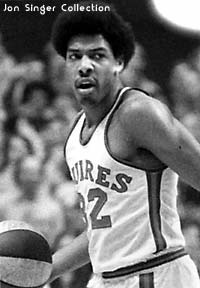 |
The Squires already had budding superstar Charlie Scott. But they also added an unheralded rookie from the University of Massachusetts, Julius Erving (#32, above left and above middle). Squires fans in Norfolk, Richmond and Hampton soon learned that Erving's nickname was "Dr. J" (because he "operated" on the court). They also learned that Erving was a master of soaring dunks, reverse spinning layups, and floating fingerrolls. When Virginia played in other ABA cities, fans came to the games just to see if Dr. J was the "real deal." He was. However, Erving and Scott were not destined to play together for very long. The high-scoring Scott bolted the Squires on March 10, 1972 to join the NBA's Phoenix Suns. And Erving tried to leave the Squires for the NBA's Atlanta Hawks in the fall of 1972. Although Erving was forced by the courts to return to the Squires, Virginia was financially unable to keep him for long. He was traded to the New York Nets after a brilliant 1972-73 campaign. In the midst of all this turmoil, the Squires did keep some good players (at least for a while). Center Jim Eakins (right, #42) was with the Squires in their very first year in Virginia (1970-71), along with defensive ace Fatty Taylor (above right, #14). Both Eakins and Taylor went elsewhere after the 1973-74 season, but became Squires once again for Virginia's last, dismal season (1975-76). |
Even though Virginia was eliminated, several Squires turned in record-setting performances in the 1972 Playoffs. Of course, Erving carried the team by averaging an amazing 33.3 points and 20.4 rebounds per game (leading the league in both categories in post-season play). George Irvine was an unheralded performer for the Squires throughout the playoffs, hitting 56 of 85 shots from the field for a startling 65.9 field goal percentage. He also hit 25 of 31 free throws for an 80.6% mark. Finally, Ray Scott and Bernie Williams performed admirably against the Floridians and New York. In Game 5 against the Nets, Scott unexpectedly scored 26 points and propelled the Squires to a crucial win. And the hot-shooting Williams replaced Charlie Scott and won over die-hard Squires fans.
For the 1972-73 season, Erving was still with the team (despite his attempt to jump to the Atlanta Hawks of the NBA), and George Gervin appeared on the scene. The two future Hall of Famers only played with each other in the latter portion of the season. However, the Squires were eliminated in the first round of the 1973 Playoffs by the Kentucky Colonels.
After the 1972-73 season, things fell apart for the franchise. Erving was sold to the New York Nets during the summer of 1973. Then, promising center Swen Nater was also sold to the Spurs. Finally, as Gervin began to blossom in his second year, he was sold to the San Antonio Spurs. Al Bianchi became known as the "Coach Who Lost A Superstar Every Year."
|
While the sale of the team's best players may have preserved the financial viability of the Squires franchise, they decimated the team and alienated the fans. Justifiably or not, most Squires fans felt that Earl Foreman had "sold out" the team. Attendance dwindled and, despite the best efforts of longtime Squires coach Al Bianchi, the Squires were horrible. During the last year of the ABA, the Squires barely managed to stay in business. In their final tumultuous year (1975-76) they had five different coaches during the course of the season. The Squires were not part of the ABA-NBA merger.
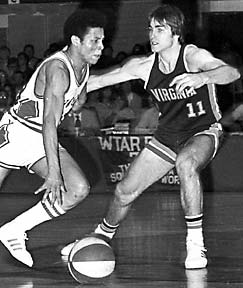 |
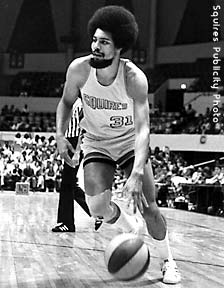 |
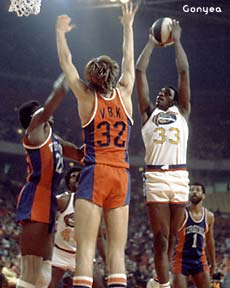 Even today, Squires fans don't like to discuss the team's last two years in the ABA (1974-75 and 1975-76). These two years were filled with countless losses (137 of them, to be exact), very rare victories (only 30 over the two seasons), bizarre-looking uniforms, and constant player-shuffling. Even today, Squires fans don't like to discuss the team's last two years in the ABA (1974-75 and 1975-76). These two years were filled with countless losses (137 of them, to be exact), very rare victories (only 30 over the two seasons), bizarre-looking uniforms, and constant player-shuffling.
During these last two seasons, the Squires had new, cash-starved owners. Those owners inherited a team that had been stripped of its most talented players. The new owners exacerbated the situation in the fall of 1975 when they fired longtime (and popular) coach Al Bianchi. Following Bianchi's departure, the Squires burned through 5 (yes, 5) more coaches during the 75-76 season: Bill Musselman, Jack Ankerson, Willie Wise, Mack Calvin, and Zelmo Beaty. Eventually it became a question of whether the team could make payroll on a week-to-week basis, and survive for the remainder of the season. They did, but barely. Here are some Squires who played hard, and tried their best, during these dismal seasons. Darrell Elston (above left, #11) was a 1974-75 rookie, out of North Carolina. He only lasted one year. George Irvine (above middle, #30) played his last year with the Squires in 1974-75, averaging 13.1 points per game. Thankfully, he left for the Nuggets in 1975-76. Mike Jackson (above right, #31) had a huge afro and good game. He was one of the few Squire bright spots in both 1974-75 and 1975-76. In the photo at right are Jan van Breda Kolff (#32), Fatty Taylor (#1) and George Govan (#25), all struggling to guard Denver superstar David Thompson early during the 1975-76 season. |
OFF-SITE SQUIRES ARTICLES AND NEWS:
American Academy of Achievement Interview with Julius Erving (© 1997 American Academy of Achievement)
American Academy of Achievement Julius Erving Biography (©1997 American Academy of Achievement)
Dr. J, Ice recall ABA's fun times (by Martin Fennelly, © Tampa Tribute, October 15, 1997)
Squires 1970-71 Road Uniform |
Squires 1971-72 Home Uniform |
Squires 1971-72 Road Uniform |
 Squires 1972-74 Road Uniform |
 Squires 1974-75 Home Uniform |
Squires 1975-76 Home Uniform |
1970-71 Season
Record: 55-29, First Place in Eastern Division
1971 Playoff Results:1971 Eastern Division Semifinals vs. New York Nets
Squires won series, 4-21971 Eastern Division Finals vs. Kentucky Colonels
Kentucky won series, 4-2
Record: 45-39, Second Place in Eastern Division
1972 Playoff Results:1972 Eastern Division Semifinals vs. The Floridians
Squires won series, 4-01972 Eastern Division Finals vs. New York Nets
Nets won series, 4-3
Record: 42-42, Third Place in Eastern Division
1973 Playoff Results:1973 Eastern Division Semifinals vs. Kentucky Colonels
Colonels won series, 4-1
Record: 28-56, Fourth Place in Eastern Division
1974 Playoff Results:1974 Eastern Division Semifinals vs. New York Nets
Nets won series, 4-1
Record: 15-69, Fifth Place in Eastern Division
Missed Playoffs
Record: 15-68, Last Place
Missed Playoffs
The off-site news articles which are mentioned above are copyrighted by their respective authors, newspapers, or news organizations.